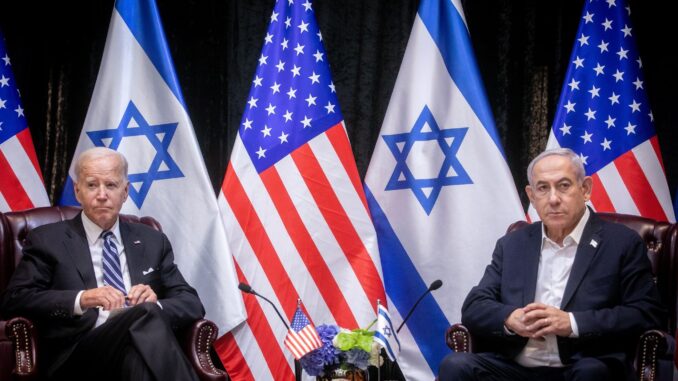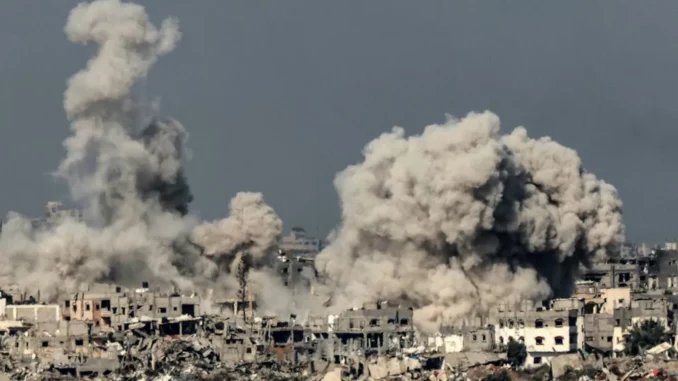Israel’s prime minister says he won’t allow the Palestinian Authority to take over Gaza
By David S. Cloud, Carrie Keller-Lynn, Summer Said and Andrew Restuccia, WSJ Dec. 12, 2023 4:40 pm ET

President Biden and Israel’s Prime Minister Benjamin Netanyahu clashed Tuesday over who should govern Gaza after the war, in a remarkable public display of differences emerging between the two leaders over the conflict.
Speaking during a fundraiser in Washington, Biden made his toughest remarks since the war began about Netanyahu’s government. He suggested that its hard-line stance has prevented Netanyahu from accepting the Biden administration’s postwar plan to have the Palestinian Authority take over Gaza, and that it would also obstruct progress toward political, economic and security arrangements that could spawn a separate Palestinian state—an outcome the U.S. president sees as a long-term solution to the conflict.
“He’s a good friend, but I think he has to change…This government in Israel is making it very difficult for him to move,” Biden said, referring to Netanyahu. He called Israel’s government the most conservative in Israel’s history, adding that some in the government oppose a two-state solution. Biden said members of the Israeli government want retribution “against all Palestinians,” not just Hamas.
Biden also warned that Israel’s approach to the war could result in a loss of support around the world. “Israel’s security can rest on the United States, but right now it has more than the United States. It has the European Union, it has Europe, it has most of the world supporting it,” he said. “But they’re starting to lose that support by the indiscriminate bombing that takes place.”
Authorities in Hamas-run Gaza say more than 18,400 Palestinians have died in Gaza, two-thirds of them women and children. The figures don’t distinguish between militants and civilians.
Biden reiterated his own staunch support for Israel following the Oct. 7 attack by Hamas, which killed 1,200 people, and stressed that Israel has a right to defend itself. Hundreds were taken hostage in the attack. “The safety of the Jewish people, the literal security of Israel as an independent Jewish state is literally at stake,” Biden said.
Biden’s comments came as Netanyahu said in Israel he would block the Biden administration’s postwar plan to have the Palestinian Authority take over Gaza, the sharpest sign of Israeli pushback against the U.S. blueprint for administering the enclave after Israel’s invasion ends.
“After the great sacrifice of our civilians and our soldiers, I will not allow the entry into Gaza of those who educate for terrorism, support terrorism and finance terrorism,” Netanyahu said, referring to the Palestinian Authority, which currently oversees parts of the West Bank, in a statement Tuesday.
“I will not allow Israel to repeat the mistake of Oslo,” he added, referring to the 1993 agreement that established the Palestinian Authority and which Netanyahu has long criticized.
The comments underscored the sharpening split between the Israeli government and the White House over postwar plans and it raised questions about the viability of the U.S. goal of having the Palestinian Authority take over from Hamas, the U.S.-designated terror group that has ruled Gaza and that Israel has vowed to destroy.

An explosion in Gaza as viewed from Israel. PHOTO: AMIR LEVY/GETTY IMAGES
The plan was already facing opposition from Arab governments and from Palestinian Authority officials themselves, who say they want Israel to halt its offensive in Gaza and withdraw its troops before they will agree to serious talks about postwar planning.
Israel’s position on who will replace Hamas in postwar Gaza may not become fully clear until elections that are expected to be held next year, when it will be decided whether Netanyahu survives as prime minister.
His rejection Tuesday of a Palestinian Authority role in Gaza was intended to help shore up his flagging domestic support, amid calls for his resignation for failing to prevent Hamas’s attack and the government’s early fumbles in handling the crisis, Israeli analysts said.
It is a message designed to resonate with Netanyahu’s right-wing and centrist voters, said Michael Oren, who served as Israel’s U.S. ambassador under Netanyahu from 2009 to 2013. The prime minister is “saying Oslo was a worse catastrophe for Israel than Oct. 7 and I am the best guarantor you have that [such an agreement] won’t happen again.”
He “is playing politics with our national security,” Oren added, noting a United Nations Security Council resolution calling for a cease-fire last week was blocked because of “an American veto.”
Ehud Yaari, a fellow at the Washington Institute for Near East Policy, said Netanyahu’s opposition to Palestinian Authority rule in Gaza is related to his own domestic political survival, but it isn’t a position necessarily shared by his entire cabinet, which sees little to be gained from defying the White House.
“At the moment, Bibi is just playing to the gallery, and the gallery is his political base,” said Yaari, using Netanyahu’s nickname. “I don’t think we’re at a point where Bibi feels he is obliged to make a decision.”
“There is no other game in town right now in terms of an organized, institutionalized Palestinian political entity,” Biden’s deputy national security adviser Jonathan Finer said Thursday in remarks at the Aspen Security Forum, a Washington policy event. “What is the alternative?”
Netanyahu’s resistance to a Palestinian Authority postwar role in Gaza only applied to it “as currently constituted,” Finer said, implying Israel would be more flexible if Palestinian Authority President Mahmoud Abbas carries out reforms. U.S. officials have met with Abbas, and other officials, to urge such steps in recent weeks.
But Netanyahu has warned that Israel won’t be safe from attack until Gaza is demilitarized, which he says the Palestinian Authority will never agree to carry out.
The role of the Palestinian Authority isn’t the only area where Israel’s right-wing government and the Biden administration are at odds.
Netanyahu’s government is considering creating milewide buffer zones inside Gaza that will be mostly off limits to Palestinians, an idea the Biden administration opposes because it could shrink the enclave’s territory. And a senior Israeli official said Sunday that forces could remain inside Gaza for an indefinite period, despite Biden administration warnings against reoccupying the strip.
Netanyahu acknowledged the disagreements between Israel and the U.S., saying he hoped the U.S. and Israel could reach consensus on a plan for postwar Gaza, just as they are in agreement on Israel’s goal of ousting Hamas.
The still-developing plans for Gaza under discussion between the U.S. and Arab governments envision an interim government running the enclave for an undefined period, drawing on the remnants of the Hamas-led ministries that delivered services before the invasion, Arab officials said. A massive aid infusion would be needed from United Nations agencies and donor countries to stabilize and rebuild the devastated enclave, according to Arab officials.
Only then would a revamped Palestinian Authority take over full control, officials said.
The U.S.-Israeli split over postwar planning is complicating preparations to supply Gaza with desperately needed food, shelter and security once Israel’s offensive ends, perhaps early next year, U.S. and Arab officials said. Unless the U.S. and Israel can narrow the differences, ending heavy combat in Gaza could leave a dangerous power vacuum in Gaza and slow the international response.
Along with talks with Israeli officials on what has become known as the “day after” in Gaza, the Biden administration has been privately pushing Arab governments and others to consider providing aid and security to prevent a bloody quagmire, U.S. officials said.
The U.S.-led effort has taken on new urgency as fighting has expanded to the south, deepening the humanitarian crisis facing its 2.2 million residents, the officials said. The U.S. has told Israel this month that it wants the war wrapped up in weeks, not months, bringing the postwar period into clearer focus.
“Now is the time to begin having conversations about postconflict governance,” said a Biden administration official familiar with the talks. “We all have an interest in seeing a revitalized Palestinian Authority take over in Gaza—we can’t have Hamas in power and we can’t leave a vacuum—and steps must begin now to ensure that can happen.”
In the war’s next phase, Israel is likely to pull its forces back to the periphery of Gaza and shift to smaller-scale raids, analysts said. It would likely still be seeking to free its remaining hostages and target surviving leaders in Hamas, the U.S.-designated terrorist group whose surprise Oct. 7 attack in southern Israel killed 1,200 people and sparked the Gaza invasion, analysts said.
For their part, Palestinian Authority officials say they are willing to resume responsibility for Gaza but there is resistance to reforms suggested by the U.S. and a reluctance to consider any steps before Israel withdraws. “We are not going to go to Gaza on an Israeli military tank,” Palestinian Authority Prime Minister Mohammad Shtayyeh said in an interview.
Omar Abdel-Baqui contributed to this article.
Write to David S. Cloud at david.cloud@wsj.com and Summer Said at summer.said@wsj.com



Biden can’t justification the 2 state solution any more than he can explain his own multi state of mind.
@Dreuveni
Wait a few seconds for the edit function to appear.
Ted: “Biden should be made to justify why he thinks the Two-State solution is the best or only solution.”
Justify? First ask him to justify the untouched chaos at the southern border of the US…
In short, the US should be studiously ignored at this point in time… Or what?
Lets not waste time and energy getting Biden to “justify” what he thinks Israel should do.
In “dueling remarks”, Biden is likely to trip over his own sword and fall.
@Ted, as you can see, the click to edit function doesn’t work correctly.
@Ted,
Thanks for your comments. It is quite obvious that Obiden is/are following their own irresponsible agenda, which, if followed, will lead to the demise of Israel.
If the Arab and/or Islamic countries are not willing to accept their responsibility for the “Palestinians”, they will have to put up with a military government provided by Israel. PLO and all associated groups have no intention of allowing anyone to live in peace except under Muslim rule, and we know what that means.
@Ted,
Thanks for your comments. It is quite obvious that Obiden is/are following their own irresponsible agenda, which, if followed, will lead to the demise of Israel.
If the Arab and/or Islamic countries are not willing to accept their responsibility for the “Palestinians”, they will have to put up with a military government provided by Israel. PLO and all associated groups have no intention of allowing anyone to live in peace except under Muslim rules, and we know what that means.
I made this comment on the WSJ.